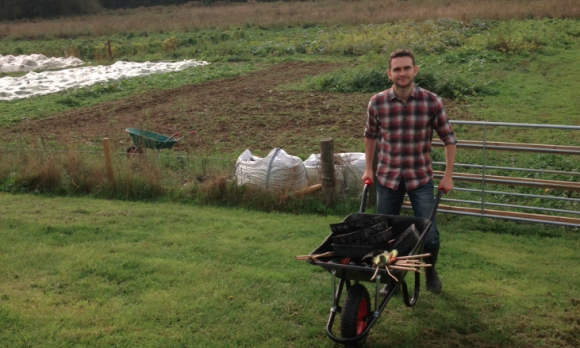Mind Food
‘Care farming’ is growing in popularity as a way of easing the stress of mental ill health, finds Figen Gunes. //
“The devil makes work for idle hands,” says the oldest volunteer at Mind Food to refer to her disturbing thoughts while she was in a psychiatric unit for 13 years. Mind Food is a social enterprise that aims to help people with mental health issues recover through farming.
Seventy-one-year-old Londoner Alethea Hamilton-Hunter now seems to be keeping herself happily occupied with growing vegetables and not worries. She eagerly tells me how much confidence she has built up through farming.
Mind Food is based at a three-acre site in leafy Amersham and produce is sold at Acton Market every Saturday. The first weekend of October saw record profits of £212 after sales increased at the market and the Edible Ealing box scheme bought from Mind Food volunteers.
‘Care farming’ is a relatively new phenomenon in the UK. Anyone suffering from claustrophobia, urban environment anxiety, bipolar, depression or other conditions has the opportunity to come out and engage with nature on these sites.
Social entrepreneur Ciaran Biggins, co-founder of Mind Food in 2012, has a vision of embedding care farming into the NHS so that health practitioners can refer patients to these alternative organisations to let them therapeutically engage with nature while on medicine.
Biggins has already connected with west London NHS Trust to introduce his initiative. But due to changes taking place in the NHS, he thinks next year will be a better time to make progress.
Having recently graduated from the School for Social Entrepreneurs, he is full of enthusiasm for a change in how mental health illnesses are treated through the National Health Service.
Biggins works with charities, namely Mind in west London, CAPE in Acton and Green Corridor, a young people’s charity. A horticultural NVQ is provided for young people aged 15 to 25 through youth charity Green Corridor.
“We will use the first two years to work with charities to build up our evidence that farming is effective for illnesses and then use that evidence to speak to GPs and the NHS,” says Biggins of his plans. “People can be referred to farms. We have done a survey over the last 12 months among Mind Food participants. Eighty per cent who took part in the survey said they felt happier. Ninety per cent felt calmer and 100 per cent believed they gained skills they can use in everyday life,” he says.
Biggins suffered from mental health issues while at university due in part to recreational drug taking. But thanks to funds made available by Amy Winehouse Foundation and Unltd social entrepreneur network, he has since realised his dreams of helping others.
‘Farming on prescription’ has been tested in Clinks Care Farm in Norfolk as an NHS pilot scheme of referrals is under way. GPs prescribe a series of sessions on the farm for those with mental health issues.
Doeke Dobma and his wife Iris van Zon, who run Clinks Care Farm in Norfolk believes “something magic happens when people look for cure in nature” and hopes ‘green care’, which is widely available in the Netherlands, will spread further around the UK adding to the already 170 care farms already offered as alternative routes of healing.















Write Your Comment